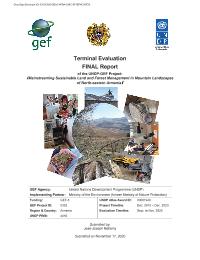
Sustainable Land and Forest Management in the North Eastern Armenia Final Evaluation
Completedon 31 Dec, 2020
Evaluation Plan
Planned End Date
Dec 2020
Evaluation Type
Project
Management Response
Yes
Evaluation Budget
$40,000
Evaluation Title
Sustainable Land and Forest Management in the North Eastern Armenia Final Evaluation
Atlas Project Number
81940
Plan Period
Status
Completed
Type
Project
Plan Date
31 Dec, 2020
Completion Date
31 Dec, 2020
Budget
$40,000
Expenditure
$13,000
Source of Funding
UNDP
Management Response
Yes
Quality Assessment
Yes
Joint Programme
No
Joint Evaluation
No
GEF Evaluation
Yes
Expand
Countries
Armenia
Atlas Project Number
81940
Plan Period
Status
Completed
Type
Project
Management Response
Yes
Plan Date
31 Dec, 2020
Quality Assessment
Yes
Completion Date
31 Dec, 2020
Joint Programme
No
Joint Evaluation
No
Budget
$40,000
GEF Evaluation
Yes
Expand
Expenditure
$13,000
Source of Funding
UNDP
Countries
Armenia
Output 1.3. Solutions developed at national and sub-national levels for sustainable management of natural resources, ecosystem services, chemicals and waste
Goal 15. Protect, restore and promote sustainable use of terrestrial ecosystems, sustainably manage forests, combat desertification, and halt and reverse land degradation and halt biodiversity loss
15.2 By 2020, promote the implementation of sustainable management of all types of forests, halt deforestation, restore degraded forests and substantially increase afforestation and reforestation globally
1: Environment & Sustainable Development
2: Others


